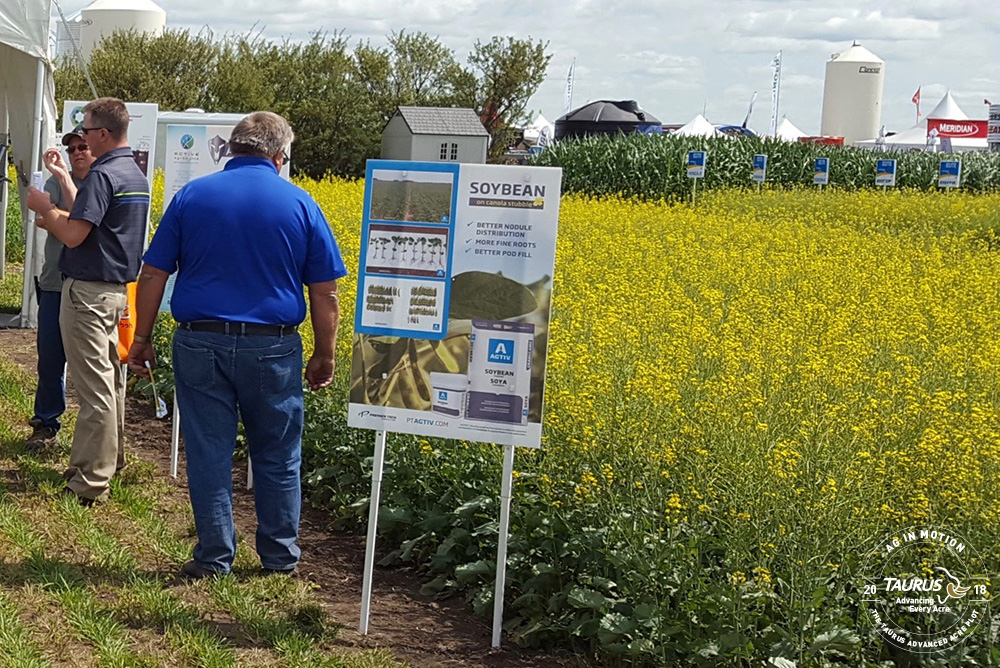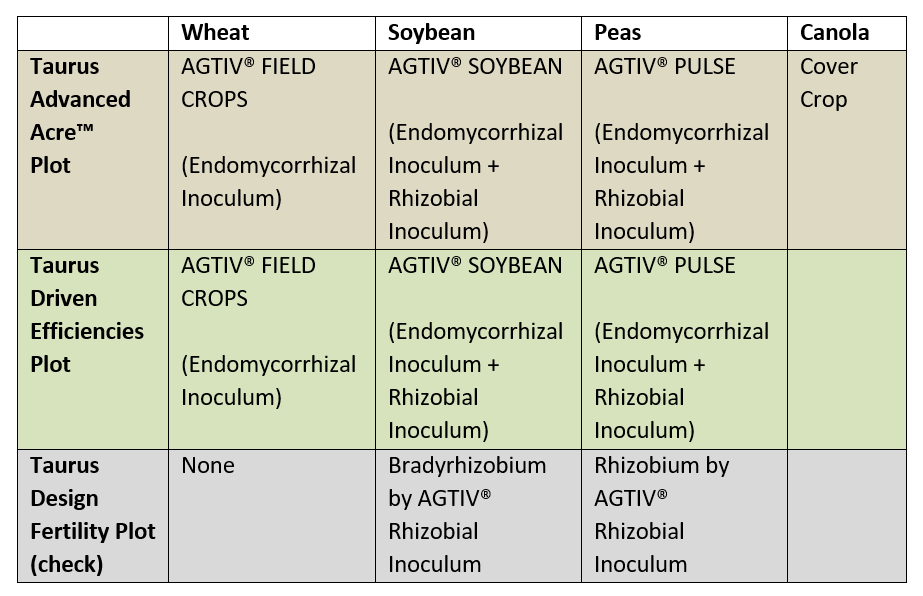
What if What You Don’t See in Your Field is as Important as What You Do See?
One of Taurus’ big focuses when it comes to advanced farming practices has been on expanding our knowledge about the complex relationships that take place between plants and organisms in the living soil. This is considered by many to be the next frontier in crop science – and a way to improve sustainability on the farm through natural science.
While these organisms are microscopic, the Ag In Motion test plots allows us to see the results biological inoculants can deliver by establishing mutually beneficial (symbiotic) relationships with the plant. They also allow us to put some recent findings around soil health into practice.
Our inoculant strategy.
Taurus is growing four crops at Ag In Motion: wheat, peas, soybeans and canola. We are applying AGTIV® biological Inoculants from Premier Tech on the Taurus Advanced Acre™ and Taurus Driven Efficiencies Plots.
Because use of a rhizobium inoculant is standard practice among progressive growers on pea and soybean crops, we have included a rhizobium inoculant in the check plot as well. However, the Premier Tech product we are using on the Advanced Acre™ and Driven Efficiencies plots also included mycorrhizae.
Our canola acres will not receive an inoculant, because we know that canola and other brassica crops treat beneficial microbes as pathogens and will release chemicals that will reduce these microbe populations. This has an adverse effect on soil health. (More on this below)
Why are we using Premier Tech biological inoculants and how do they benefit the plant?
There are thousands of microbes in the soil. These are living organisms such as bacteria and fungi. Some are considered good or beneficial (such as mycorrhizae and rhizobium), some are considered pathogens that are harmful to plants (like fusarium and sclerotinia). There are significantly more good microbes than bad.
Microbial activities can benefit a plant in three key ways:
- Nitrogen Fixation
- Biological Control (disease suppression)
- Growth Promotion/ Biostimulation
Premier Tech biological inoculants align with Taurus’ core values, as they are scientifically formulated to deliver tangible results – and are produced to ensure the highest degree of consistency and quality control. Let’s look at the specific biologicals we are focusing on.
How mycorrhizae improve absorption of nutrients and water.
Arbuscular Mycorrhizal Fungi (AMF) is a valuable microbe in the soil that forms very interesting symbiotic relationships with plants at the root level.
In exchange for carbon (provided by the plant as simple sugars), AMF colonizes the plant’s roots and form hyphae – which are small filaments that act as extensions of the root. These hyphae are 10 times finer than root hairs and extend 30 times further. This essentially increases the surface area for nutrient and water absorption, allowing the plant to explore soil well beyond the reach of the roots alone.
Other benefits to plants include: increased photosynthesis, growth stimulation, environmental stress tolerance, disease resistance, and soil structure improvement.
In Canada, plants colonized by AMF have been shown to yield 8% to 10% higher than plants with low AMF populations.
We are striving to demonstrate this benefit through our Advanced Acre™ and Driven Efficiencies test plots (with the exception of canola). All of these plots are treated with an inoculant from Premier Tech that contains mycorrhizae.
Learn more:
Good fungi and bad fungi: an agronomic overview.
The role of mycorrhizae in drought defence.
Adding a one-two punch to soybean and pea plots with a dual inoculant.
Rhizobium inoculants have become standard practice among progressive pulse and soybean growers. No wonder. Science has revealed the reason these crops are so efficient at fixing nitrogen is due to their relationship with these helpful soil-borne bacteria.
Nodulation is guided by signals the roots receive from leaves when they have a Nitrogen deficit. The number of nodules produced should be proportional to N requirements for growth, and therefore regulate the amount of sugar given to nodule formation and function.
The rhizobium penetrates the root hair and enters the plant cells to initiate root nodulation. Here, they work to fix raw nitrogen from the air into plant-available ammonium.
The ability to fix so much nitrogen and leave it in the soil for the following crop is a reason that soybeans and peas are such valuable rotation crops. Rhizodeposition and root biomass of pulses leave a great quantity of N in soils after the harvest: making up as much as 90% of N in soil. Soil N after harvest represents approximately 30% of plant-accumulated N during growth (Voisin 2015).
Nitrogen fixation is an energy-intensive process that involves ample sugars and nutrients, including Phosphorus. The challenge with legumes is that they invest In nodules to the detriment of roots and therefore are not great at absorbing Phosphorus, which is largely immobile in the soil. However, by harnessing the power of AMF to extend deeper into the soil – we have a natural solution to the problem.
This is why Taurus believes in using a dual inoculant for soybean and pulse crops. Basically, it creates a three-way symbiotic relationship between the plant, bacteria, and fungi (called a tripartite association).
It’s a win-win-win for the plant, the rhizobium, and the mycorrhizae. Benefits to the plant include increased photosynthetic rate to supply more energy for nitrogen fixation activity, nodulation parameters, and a more balanced N:P:C supply ratio for better growth.
AGTIV® SOYBEAN and AGTIV® PULSES have been used on our Advanced Acre™ and Driven Efficiencies plots. Initial plant stand counts are very promising and are higher than the checks that do not have the benefit of the dual inoculant.
Improving soil health: a 5-year strategy.
A&L Canada Laboratories is a leader when it comes to research and testing methods related to soil health and the relationships taking place in the rhizosphere.
They are the first laboratory to have developed an accurate suite of soil health tests – which can provide an accurate picture of microbe levels in the soil, with a focus on the beneficial microbes. These findings can be used as part of a 5-year plan to improve soil quality.
Taurus conducted the soil health test on our plots this year, and plan on using the findings to improve soil quality on these plots in the upcoming years.
A&L’s research has led to several interesting insights. For example, they have discovered that it is better to have a less diverse population of microbes associated with a plant and instead promote associations with a narrow selection of key microbes. This is because multiple microbes compete with one another for resources and reduce the value a concentrated population of the right microbes can bring to a plant.
They have also learned that rhizobium can benefit from certain micronutrients including Boron. To learn more about their fascinating work, watch the video below.
Watch: Taurus Soil Health Webinar-Presented by A&L Labs
A new strategy to improve soil health in canola.
As we mentioned earlier, canola and other brassica crops tend to attack beneficial microbes that contribute to soil health. This is why soil productivity is generally diminished following a canola crop. We covered this in a blog called The Canola Conundrum.
At this year’s Ag In Motion Show, Taurus will be experimenting with a new practice created to maintain soil health in canola by introducing a cover crop. Is it a practical solution for growers in Western Canada? Stay tuned.
How important is healthy soil to a high-yielding crop?
This is one of the questions we will be answering at Ag In Motion. We hope you are able to join us in Saskatoon July 17 – 19. The Taurus team will be available to answer all of your questions around the how’s and why’s of soil health and the strategic use of biological inoculants. We hope to see you there!


